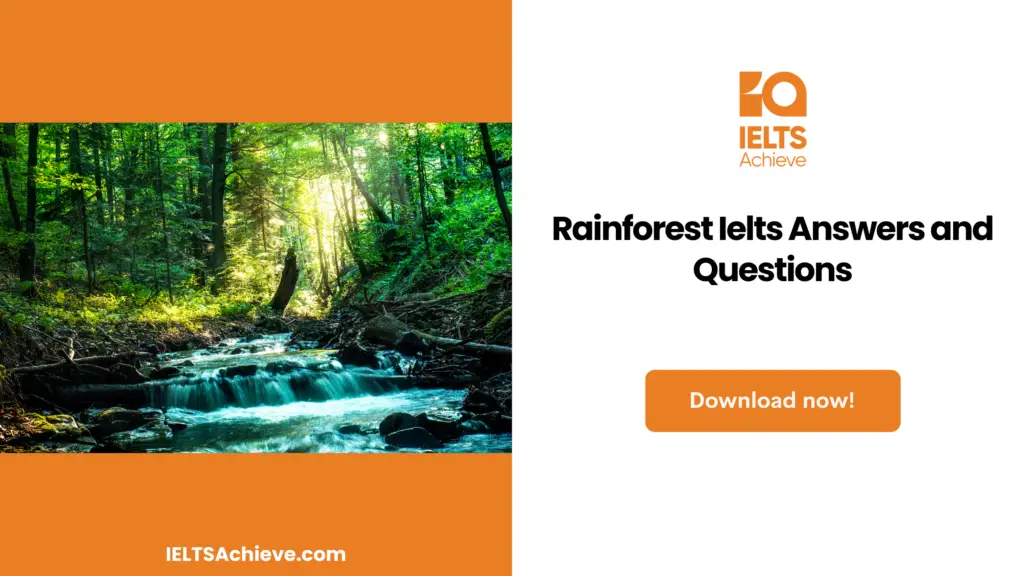The Blog post contains the following IELTS Reading Questions:
- IELTS Reading Short Answer questions
- IELTS Reading Matching Features
- IELTS Reading True/False/Not given
Stay informed and prepared for success – Explore our comprehensive Reading Test Info page to get valuable insights, exam format details, and expert tips for mastering the IELTS Reading section.
IELTS reading passage – Rainforest

Rainforest
Adults and children are constantly exposed to claims regarding the alarming rate of tropical rainforest extinction. For instance, an estimate that rainforests are being destroyed at a rate comparable to one thousand football fields every forty minutes – around the length of a typical school time – is a graphic picture to which youngsters may quickly relate. In light of the regular and vivid media coverage, it is conceivable that youngsters will have formed opinions about rainforests — what they are, where they are, why they are essential, and what threatens them – without formal education. There is also the possibility that some of these notions are incorrect. Numerous studies have demonstrated that youngsters develop misconceptions regarding “pure” curriculum science. These fallacies are interwoven into a diverse yet organised conceptual framework, making it and its component ideas, some of which are incorrect, and more resilient but also modifiable. Children who receive information from the media may develop these ideas. Occasionally, this information may be inaccurate. It appears that schools do not provide students with the opportunity to re-express their thoughts and have them evaluated and refined by teachers and peers.
Despite the widespread media attention to the destruction of rainforests, there is little formal information on children’s perspectives on this subject. The purpose of the present study is to begin providing such information in order to assist instructors in designing their educational techniques to build on the right concepts and dispel misconceptions, as well as in developing environmental studies programs for their schools.
The study investigates children’s scientific understanding and attitudes toward rainforests. Students in secondary education were asked to complete a questionnaire with five free-form questions. The majority of solutions to the first question were self-evident from the word “rainforest.” Some children reported them as moist, humid, or warm. The second topic involved the location of tropical rainforests. The most frequent answers were continents or countries: Africa (43%), South America (30%), and Brazil (25%). Some children also provided more generalised answers, such as being close to the Equator.
The responses to the third question questioned the significance of rainforests. 64% of the students expressed the notion that rainforests provide animals with habitats. Fewer students stated that rainforests provide habitats for plants, and even fewer acknowledged rainforests’ indigenous populations. More girls (70%) than boys (60%) mentioned the rainforest as a habitat for animals. Similarly, albeit to a lesser extent, females (13%) were more likely than boys (5%) to agree that rainforests support human habitats. These findings are largely consistent with our past research of students’ perspectives on the use and protection of rainforests, in which females were found to be more empathetic to animals and to hold beliefs that appear to accord non-human animals an intrinsic value.
The fourth question discussed the reasons for rainforest loss. Perhaps encouragingly, more than half of the students (59%) recognized human actions as the cause of the destruction of rainforests, with some students personalising the guilt by using phrases such as “we are.” 18% of the students specifically mentioned logging activity.
10% of the students erroneously believed that acid rain is responsible for the destruction of rainforests, and a comparable proportion believed that pollution is destroying rainforests. Here, youngsters are conflating the loss of rainforests with the devastation of forests in Western Europe caused by these factors. Two-fifths of the students offered the information that the rainforests give oxygen, but in some cases they also embraced the misperception that the loss of the rainforests will deplete atmospheric oxygen, rendering the environment inhospitable to human life on Earth.
The majority of youngsters responded to the final question regarding the significance of rainforest conservation by stating that we require rainforests to survive. A few students (6%) mentioned that the destruction of the rainforest may contribute to global warming. This is unexpected given the extensive media attention on this subject. Several youngsters opined that the preservation of rainforests is not essential.
The findings of this study indicate that children’s perceptions of rainforests are dominated by specific notions. Students’ replies reveal misunderstandings in their fundamental scientific understanding of rainforest ecosystems, such as their views of rainforests as habitats for animals, plants, and humans, and the relationship between climate change and rainforest degradation.
Students did not volunteer ideas indicating an appreciation for the complexity of the causes of rainforest deforestation. In other words, they did not demonstrate an awareness of the variety of ways in which rainforests are significant, nor of the complex social, economic, and political forces that drive the activities that are destroying the rainforests. The results of similar studies on other environmental issues indicate that older children appear to gain the capacity to comprehend, respect, and assess divergent perspectives. Environmental education provides a venue for the development of these skills, which are vital for young children as future decision-makers.
Unlock your full potential in the IELTS Reading section – Visit our IELTS Reading Practice Question Answer page now!
Recommended Questions:
Renewable Energy IELTS Reading Question with Answer
Rainforest reading questions
Questions 1 – 5
The box below gives a list of responses A–P to the questionnaire discussed in the Reading sample.
The list of responses:
A.There is a complex combination of causes driving the disappearance of rainforests.
B.The same factors are destroying the rainforests as they are destroying the forests of Western Europe.
C.Rainforests are found close to the Equator.
D.Brazil possesses rainforests.
E.Without rainforests, certain species would be unable to survive.
F.Rainforests are essential habitats for several plant species.
G.Humans are accountable for the disappearance of the rainforests.
H.The rainforests are an oxygen source.
I.There are several reasons why rainforests are significant.
J.As rainforests are destroyed, global temperatures rise.
K.Without rainforests, there would be insufficient oxygen in the atmosphere.
L.There are those that call the rainforests home.
M.Rainforests are found in Africa.
N.Rainforests are not essential to human existence.
O.Logging is directly responsible for the devastation of the rainforests.
P.Human survival depends on the survival of the rainforests.
Answer the following questions by choosing the correct responses from A–P
Write your answers in boxes 1–5 on your answer sheet. (Guide: Candidates need to write correct answers to the questions from 1 to 5)
1.What was the most common response of youngsters when asked where the rainforests were?
2.What was the most frequent response to the significance of rainforests?
3.What did most children attribute to the disappearance of the rainforests?
4.Why did the majority of children believe that protecting the rainforests was essential?
5.Given the time spent discussing the problem in newspapers and on television, which response is cited as surprisingly rare?
Questions 6
Choose the correct letter A, B, C, D or E. Write your answer in box 6 on your answer sheet.
6.Which of the following is the best title for Sample Passage of Rainforest?
| A | The incorporation of an environmental studies curriculum within a science curriculum |
| B | Children’s perspectives on rainforests and the consequences for curriculum development |
| C | The extent to which youngsters have been misinformed about rainforests by the media. |
| D | How to collect, organise, and describe the ideas of high school students |
| E | The significance of the rainforests and the causes of their loss are discussed |
Ready to conquer Matching Headings questions? Click here to learn essential tips and techniques for matching headings accurately to paragraphs or sections in the IELTS Reading section.
Questions 7 – 14
Do the following statements agree with the information given in the Reading Passage?I n boxes 7-14 on your answer sheet, write
TRUE if the statement is true
FALSE if the statement is false
NOT GIVEN if the information is not given in passage
7.Media outlets have mostly disregarded the crisis of the rainforests.
8.Children only accept rainforest-related viewpoints they encounter in the classroom.
9.It has been proposed that youngsters have erroneous perceptions of the “pure” science they study in school.
10.Because children’s views about science are part of a larger conceptual framework, it is easier to alter them.
11.Children were asked a series of yes/no questions, such as “Are there any rainforests in Africa?”
12.Girls are more likely than males to hold erroneous opinions regarding the destruction of rainforests.
13.This paper is the latest in a series of studies that have examined children’s knowledge of rainforests.
14.A second study is planned to assess the perspectives of elementary schoolchildren on rainforests.
Enhance your skills in identifying information as True, False, or Not Given. Click here to discover expert strategies and techniques for mastering this question type in the IELTS Reading section.
Unlock your full potential in the IELTS Reading section – Visit our IELTS Reading Practice Question Answer page now!
Recommended Questions:
Renewable Energy IELTS Reading Question with Answer
Rainforest reading answers
1. M
2. E
3. J
4. P
5. J
6. B
7. False
8. False
9. True
10. True
11. False
12. Not given
13. True
14. Not given

We hope you found this post useful in helping you to study for the IELTS Test. If you have any questions please let us know in the comments below or on the Facebook page.
The best way to keep up to date with posts like this is to like us on Facebook, then follow us on Instagram and Pinterest. If you need help preparing for the IELTS Test, join the IELTS Achieve Academy and see how we can assist you to achieve your desired band score. We offer an essay correction service, mock exams and online courses.

